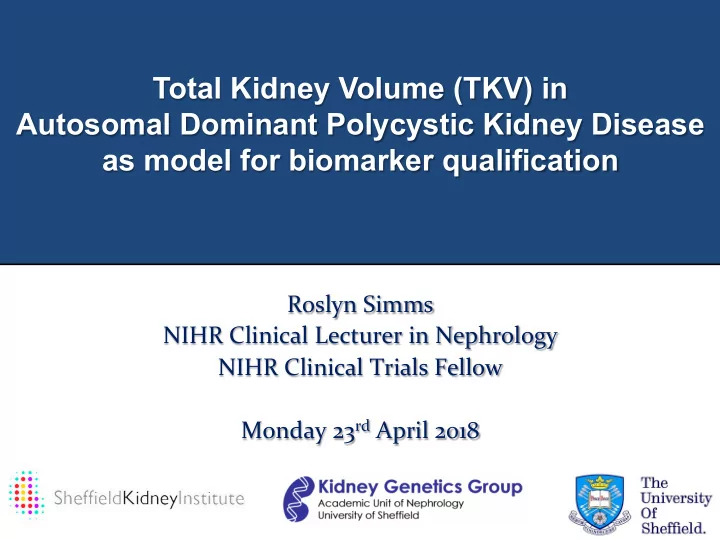

Total Kidney Volume (TKV) in Autosomal Dominant Polycystic Kidney Disease as model for biomarker qualification Roslyn Simms NIHR Clinical Lecturer in Nephrology NIHR Clinical Trials Fellow Monday 23 rd April 2018
• Background • Total kidney volume (TKV) & Clinical relevance • CRISP studies • Timeline of Biomarker qualification • Summary
Autosomal Dominant Polycys0c Kidney Disease (ADPKD) ADPKD • Commonest inherited kidney disease • 3 rd commonest cause of renal failure (UK) • Disease progression is a patient priority • Monitoring progression currently – eGFR late marker Normal ESRF Cornec-Le Gall JASN 2013 Barua, JASN 2009 • Known genotype: 80yr variability 68yr 56yr
Total kidney volume (TKV) in ADPKD • Gradual cyst development/years à ↑ TKV • TKV clinically relevant, marker of progression : 1981: 1 st measured (n43, CT) correlated 1/CrCl (Thomsen) 1992: 1 st longitudinal (8yrs, n1, U/S) (Gabow) 2000: 1 st prosp. (8yrs, n9, CT) rate ↑ TKV 4%/yr (King) Retrosp. (5yrs, n10, CT) faster ↑ TKV α ↓ GFR (Sise)
Evidence of TKVs clinical relevance in ADPKD • TKV clinically relevant : 2001: Longit. (20yrs, n182, U/S): rate ↑ TKV exponential and correlated hypertension (Fick-Brosnahan) 2002: 1 st large longit. (7.8yrs, n229, U/S) rate ↑ TKV 8.2%/yr, ↑ TKV α ↓ GFR (Fick-Brosnahan) CRISP : Consortium for Radiologic Imaging Studies of PKD Aim - reliably & accurately measure TKV and TCV - detect change in TKV & TCV/short time frame - is TKV, TCV associated with ↓ GFR Annual MRI, 241 patients, 16-45yrs, eGFR>70ml/min
Consortium for Radiologic Imaging Studies of PKD (Chapman 2003) CRISP1 : 3yrs 4 centres (different vendors) recruiting (12/2000-10/2001) Standardisation protocol: Phantoms (known volume – gold std) 4 pts (travelling kidney, (TKV 540-2550ml) scanned each centre <1wk apart) Image transfer & analysis by analysts (2/phantoms, 3/pts) Gadolinium used
CRISP outcomes & Key developments in Biomarker qualification CRISP1 (Chapman 2003) : TKV measurement reliability 99.9% (phantoms) 0.998 (pts) TKV increased at 5.3%/year TKV greater with age, hypertension, urinary albumin exct. TKV inversely correlated with GFR (iothalamate) 2007: PKD Foundation & FDA: Acceptance of kidney growth as 1 ° outcome will encourage industry for PKD drug development 2009: Developed data standard to pool data & quantitative modelling methods (pharmacometrics, ADPKD specific)
Timeline of progress of TKV becoming a prognostic biomarker in ADPKD
2012: CRISP2 outcome evidence CRISP2: n201, further 5yrs f/u, MRI every 2yrs, No Gad. Aim – does TKV predict ↓ GFR? Chapman 2012 1.0 htTKV Change from baseline Mean f/u 8yrs 0.5 0.0 GFR -0.5 -1.0 0 1 2 3 4 6 8 Follow up (yrs) Baseline HtTKV>600ml/m predicts Stage 3CKD within 8yrs
TKV as a prognostic biomarker in ADPKD By 2012 , evidence that TKV: • prognostic biomarker (CRISP studies) • useful all stages of drug dvp (1 ° endpoint TEMPO 3/4) PKDOC (Polycystic Kidney Disease Outcomes Consortium) formally commenced Biomarker Qualification Used evidence (2355pts, collected over 40yrs): 2 longitudinal studies: CRISP1&2 3 US registries (Mayo, Universities Colorado & Emory)
Timeline of Acceptance (FDA) of TKV as a prognostic biomarker in ADPKD PKDOC à Biomarker Qualification Review Team (BQRT) 3/1/12: Letter of Intent (LOI) submitted to FDA COU: baseline TKV predicts pts at high risk of progression 6/3/12: LOI feedback (FDA) 24/9/12: Submit Qualification Plan (QP)/Briefing Document 11-12/12: Discussions/feedback 30/4/13: Revised QP submitted 28/6/13: PKDOC met BQRT. Further discuss (7-9/2013) 27/9/13: Final QP (+Qus to address) submitted to FDA 15/9/16 : FDA approved TKV as prognostic biomarker Time frame (submission à approval): 56 months
Timeline of Acceptance (EMA) of TKV as a prognostic biomarker in ADPKD PKDOC à Biomarker Qualification Review Team (BQRT) 10/4/13: Letter of Intent (LOI) submitted to EMA COU: baseline TKV predicts pts at high risk of progression 30/4/13: Submit Qualification Plan (QP)/Briefing Document 13/6/13: Feedback & queries re QP 28/6/13: Written response to EMA queries 24/7/13: Submitted final QP 13/11/15: EMA approved TKV as prognostic biomarker Time frame (submission à approval): 31months
Summary • Extensive evidence that the biomarker, TKV, is a clinically relevant measure of disease progression in ADPKD • Combined with age & eGFR, TKV identifies patients early who have a high risk of progressive decline. This facilitates clinical trial enrichment & drug development • The process of achieving regulatory approval of a biomarker is time consuming
Acknowledgements Professor Albert Ong
Recommend
More recommend